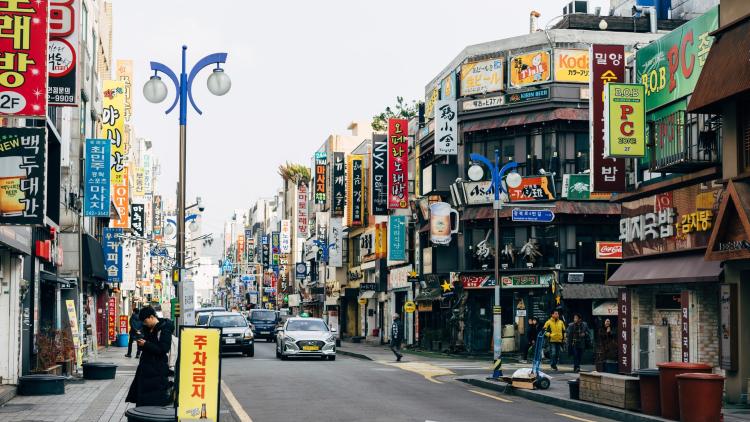Korean Cinema (UG)

Key information
- Status
- Module not running
- Module code
- 155901477
- FHEQ Level
- 6
- Credits
- 15
- Department
- Department of East Asian Languages and Cultures
Module overview
The module is designed to offer a critical overview of Korean cinema, and its progression from the beginning to the present day. It will be looking at how actors and directors are involved in the industry.
Objectives and learning outcomes of the module
On successful completion of this module a student will be able to:
-
Demonstrate a clear and critical knowledge about the discourses present in Korean cinema
-
Demonstrate a knowledge about Korean directors and actors
-
Demonstrate ability to critically analyse key concepts of cinema: genre, national cinema, narrative cinema using the Korean context as a model
-
Apply the theoretical concepts from the core texts to Korean cinema in an articulate and critical manner
-
Express and defend positions about cinema both orally and in writing
-
Develop their own particular research interests independently
Workload
Total taught hours : 20 hours. 2 hours of lectures per week for 10 weeks.
Independent study : 130 hours
Total hours for module : 150 hours
Scope and syllabus
The syllabus will include a focus on directors and actors active in Korea and topics prevalent in the wider East Asian region. It will similarly introduce some of the core texts and films in relation to Korean cinema.
Method of assessment
- Reaction paper (800 words) 25%
- Essay (2500 words) 75%
Suggested reading
Core Reading
- Lee, S. (2019) Rediscovering Korean Cinema. University of Michigan Press
- Klein, C. (2020) Cold War Cosmopolitanism: Period Style In 1950s Korean Cinema. University of California Press
- Kim, D. (2018) Transnational Korean Cinema: Cultural Politics, Film Genres, And Digital Technologies (2019). by Dal Yong Jin. Rutgers University Press
- Choe, S (2018) Sovereign Violence: Ethics And South Korean Cinema In The New Millennium. Amsterdam University Press
- An, J. (2018). Parameters Of Disavowal: Colonial Representation In South Korean Cinema. University of California Press
- Ward, S (2018) Okja: The Art And Making Of The Film. Titan Books
- Choe, Y (2016). Tourist Distractions: Traveling And Feeling In Transnational Hallyu Cinema. Duke University Press
- Yecies, B and Shim, A. (2016) The Changing Face Of Korean Cinema: 1960 To 2015. by Routeledge
- Chung, H. and Diffrient, D. (2015) Movie Migrations: Transnational Genre Flows And South Korean Cinema. Rutgers University Press
- Balmain, B. and Jackson, A. (2015) Korean Screen Cultures: Interrogating Cinema, Tv, Music And Online Games. Internationaler Verlag der Wissenschaften
Additional Reading
- Fischer, P. (2015) A Kim Jong-Il Production: The Extraordinary True Story Of A Kidnapped Filmmaker, His Star Actress, And A Young Dictator's Rise To Power. Flatiron Books
- Chung, S. (2016) Split Screen Korea: Shin Sang-Ok And Postwar Cinema. University of Minnesota Press
- Park, Y (2014). Unexpected Alliances: Independent Filmmakers, The State, And The Film Industry In Postauthoritarian South Korea. Stanford University Press
- Hughes, T (2014) Literature and Film in Cold War South Korea: Freedom's Frontier. Columbia University Press
- Peirse, A and Martin, D. (2013) Korean Horror Cinema. Edinburgh University
- Seung Chung, H. (2013). Kim Ki-Duk (Contemporary Film Directors). University of Illinois Press
- Schonherr, J. (2012) North Korean Cinema: A History. McFarland
- Yecies, B and Shim, A. (2011) Korea's Occupied Cinemas, 1893-1948. Routeledge
- Kim, K. (2011) Virtual Hallyu: Korean Cinema Of The Global Era. Duke University Press Books
- Ahn, S. (2011) The Pusan International Film Festival, South Korean Cinema And Globalization. Hong Kong University Press
- Paquet, D. (2010) New Korean Cinema: Breaking The Waves. Columbia University Press
- Choi, J. (2010) The South Korean Film Renaissance. Wesleyan
- Russell, M (2009) Pop Goes Korea: Behind The Revolution In Movies, Music,And Internet Culture. Stone Bridge Press
- Gateward, F. (2007) Seoul Searching: Culture And Identity In Contemporary Korean Cinema. SUNY Press
- Shin, C. & Stringer, J. (2005) New Korean Cinema. Edinburgh University Press
- McHugh, K. and Abelmann, N. (2005). South Korean Golden Age Melodrama: Gender, Genre, And National Cinema. Wayne State University Press
- James, D. and Kim, K. (2002) Im Kwon-Taek: The Making Of A Korean National Cinema. Wayne State University Press
- Min,E; Joo, J and Kwak, H. (2003) Korean Film: History, Resistance, And Democratic Imagination. Praeger Publishers
- Leong, A. (2002) Korean Cinema: The New Hong Kong. Trafford Publishing
- Hyangjin Lee, L. (2001) Contemporary Korean Cinema: Identity, Culture, Politics. Manchester University Press.
Disclaimer
Important notice regarding changes to programmes and modules

